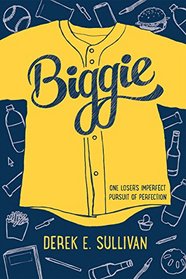I received an ARC copy of this book from the publisher in exchange for an honest review.
Biggie is the son of one baseball legend, and the step-son of another. Biggie feels the immense pressure to play sports at a young age, when his step-father enrolls him into t-ball. After a bad experience there, Biggie is convinced that he is not cut out for sports and withdraws into his own skin. He seeks perfection from himself academically rather than physically. He also eats to fill an emotional need, and finds that the bigger he gets, the more invisible he is to others.
After pitching a perfect game in wiffle ball during gym class, Biggie's interest in baseball is reignited. He, along with his younger brother Maddux, chase the elusive goal of throwing a perfect game in high school baseball. In the course of getting ready for his first baseball season, Biggie learns a lot about friendship, girlfriends, new social skills, and getting in shape. He also learns that being a perfectionist does not always have to be an all-or-nothing way of life.
I found myself alternately loving and hating Biggie. His struggles with his weight and reasons for constantly eating were at times very real, and at times seemed like rationalizations. Biggie often was often so absorbed in his fantasy online friends that he found little time to make friends in real life. His fear of getting hurt and fear of failure was evident throughout the book. Biggie learns not only that he can be happy with himself physically, but that a "perfect game" has multiple meanings.
As a librarian, I would recommend this book for high school libraries. There are mild sexual references, and frequent underage drinking.
Biggie is the son of one baseball legend, and the step-son of another. Biggie feels the immense pressure to play sports at a young age, when his step-father enrolls him into t-ball. After a bad experience there, Biggie is convinced that he is not cut out for sports and withdraws into his own skin. He seeks perfection from himself academically rather than physically. He also eats to fill an emotional need, and finds that the bigger he gets, the more invisible he is to others.
After pitching a perfect game in wiffle ball during gym class, Biggie's interest in baseball is reignited. He, along with his younger brother Maddux, chase the elusive goal of throwing a perfect game in high school baseball. In the course of getting ready for his first baseball season, Biggie learns a lot about friendship, girlfriends, new social skills, and getting in shape. He also learns that being a perfectionist does not always have to be an all-or-nothing way of life.
I found myself alternately loving and hating Biggie. His struggles with his weight and reasons for constantly eating were at times very real, and at times seemed like rationalizations. Biggie often was often so absorbed in his fantasy online friends that he found little time to make friends in real life. His fear of getting hurt and fear of failure was evident throughout the book. Biggie learns not only that he can be happy with himself physically, but that a "perfect game" has multiple meanings.
As a librarian, I would recommend this book for high school libraries. There are mild sexual references, and frequent underage drinking.




